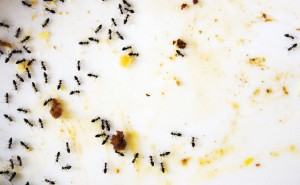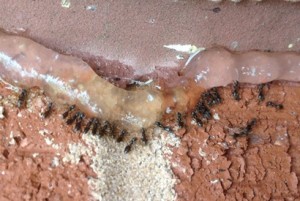 These days lots of people attempt to “Do It Yourself”. People are trying to save some money, searching for remedies and solutions on the internet for all sorts of items, including ant control. If we had a dollar, for every time we heard, “I got this stuff for ants but it didn’t work...” Well, let’s just say we’d have a lot of money. Ant control is especially challenging when it comes to dealing with Odorous House Ants. It is virtually impossible to remedy an infestation from this variety of ants without professional help. In fact, we’ve noticed that the more a property owner has done to get rid of Odorous House Ants, the more difficult it is for us to get rid of them.
These days lots of people attempt to “Do It Yourself”. People are trying to save some money, searching for remedies and solutions on the internet for all sorts of items, including ant control. If we had a dollar, for every time we heard, “I got this stuff for ants but it didn’t work...” Well, let’s just say we’d have a lot of money. Ant control is especially challenging when it comes to dealing with Odorous House Ants. It is virtually impossible to remedy an infestation from this variety of ants without professional help. In fact, we’ve noticed that the more a property owner has done to get rid of Odorous House Ants, the more difficult it is for us to get rid of them.
“What’s the issue?”
Odorous House Ants are problematic for a number of reasons. They can have colonies with as many as 10,000+ ants and have several queens. As the colony grows, they just move. For this reason, the infestation in your sunroom moves your living room, and so on. Because of having multiple queens, the colony will grow very quickly. One identification technique for figuring out if your ants are this variety is to crush one between your fingers and give it a smell. If you’re smelling something resembling rotten coconut, you’re probably holding an Odorous House Ant. Just don’t sniff too hard.
“Why isn’t my DIY working?”
Most do-it-yourselfers trying for ant control go to the local hardware or home improvement store and scour the lawn and garden section in search of their product of choice. “Oooo! This one has a cool label. It even says ‘Season-Long Control’. That’s got to be the good stuff because it’s $3.00 more than that other bottle over there.” You can search all you want, and you won’t find the good stuff. You won’t find what the pros use because it’s not available to the public. Most insecticides that you buy for D-I-Y pest control will be classified as “repellants”. This means they do a good job repelling insects. This is a bad idea for Odorous House Ants because they are too smart for that. They’ll go 50 ft. or so just to find another way in. You won’t repel them, you’ll just make them more persistent.
The Professional Difference
What separates a novice pest technician from the seasoned expert is understanding a pest AND knowing the perfect plan of attack. Our Pest Control Manager says, “It takes many battles to win the war on Odorous House Ants.” In other words, a one-time pest control treatment isn’t going to cut it. Even for the best professional pest control technician, Odorous House Ants take awhile to control. This is usually best achieved with a Quarterly Pest Control program with free call-backs in between services.
Controlling Odorous House Ants will be best achieved by using professional-grade ant baits and non-repellant insecticides. According to product manufacturer Syngenta, non-repellent products “…delayed activity helps to maximize the number of insects that come into contact with the active ingredient and improve colony control.” This ensures the oblivious ants take the control materials back to the colony and share it with their friends.
Ants are social insects, bumping against one another. Adult workers collect solid food sources and take it back and feed it to the developing larvae. The larvae then regurgitate (yes, I know, gross) the liquid digested food for the adult ants (including the queen) to ingest. This process is call “trophallaxis”. Causing the ants to come in contact with these types of materials means controlling the colony versus 30 or 40 individuals. Again, this can take a long time because of the numbers of ants, and the likelihood of multiple colonies around a structure.
If you found this blog by searching “How to Get Rid of Ants,” the best tip we can give you is to call a pro. Save your money and aggravation. Odorous House Ants are a formidable foe. Call a local pest control company and start a Quarterly Pest Control Program. Not only will it help with your ant problem, but it will also take care of all sorts of other pests. As a result, this maintenance will also help to prevent future problems as well. We’d be thrilled to answer any questions you have! You can contact us here for more information.


